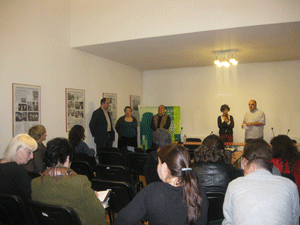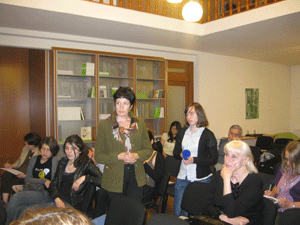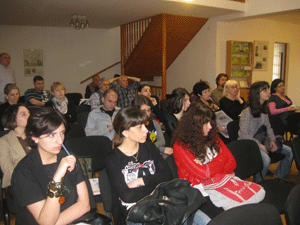
|
The Human Rights Centre First Celebrated the Muhajir Day in Tbilisi
Nino Gelashvili, Nini Topuridze
 On May 21, Abkhaz and other Caucasus nations became the victims of the cruel Russian Imperialist Policy in the 19th century. This day has been celebrated as a Day of Muhajirs by the victims of the Russian Empire since then. The Human Rights Centre decided to celebrate the day in Tbilisi and on May 21 invited the people interested in Georgian-Abkhaz conflict to the Boell Foundation at the presentation of the documentary film “Seaside of Sorrow” by Niko Tsuladze. Film-director Niko Tsuladze unclosed the unknown archive materials to the society and described how the Russian Empire carried out determined genocide against Caucasian nations, among them against Abkhaz people. The film demonstrates the life of the descendants of Muhajirs in Turkey where Georgian and Abkhaz people live together very friendly. The film-director explains the title of the film in different way: “We all now gain the results of the grave mistakes which show that we failed to foresee something and obeyed our emotions. We even made a mistake which is difficult to be improved. I think, it is case of our dignity – if you make some mistake with your friend or relative you should be brave enough to regret it and confess that you made a mistake. Or you should realize what had happened and then take proper steps.” Before the film was presented the director of the Heinrich Boell Foundation in On May 21, Abkhaz and other Caucasus nations became the victims of the cruel Russian Imperialist Policy in the 19th century. This day has been celebrated as a Day of Muhajirs by the victims of the Russian Empire since then. The Human Rights Centre decided to celebrate the day in Tbilisi and on May 21 invited the people interested in Georgian-Abkhaz conflict to the Boell Foundation at the presentation of the documentary film “Seaside of Sorrow” by Niko Tsuladze. Film-director Niko Tsuladze unclosed the unknown archive materials to the society and described how the Russian Empire carried out determined genocide against Caucasian nations, among them against Abkhaz people. The film demonstrates the life of the descendants of Muhajirs in Turkey where Georgian and Abkhaz people live together very friendly. The film-director explains the title of the film in different way: “We all now gain the results of the grave mistakes which show that we failed to foresee something and obeyed our emotions. We even made a mistake which is difficult to be improved. I think, it is case of our dignity – if you make some mistake with your friend or relative you should be brave enough to regret it and confess that you made a mistake. Or you should realize what had happened and then take proper steps.” Before the film was presented the director of the Heinrich Boell Foundation in  the South Caucasus Iris Kempe greeted the invited guests. “Boell Foundation is actively involved in similar activities. Here we host the governmental officials and representatives of the opposition parties. I have recently returned from Kiev where I participated together with the representatives of the Caucasian countries in the conference. There we discussed the future of the South Caucasus region and I have returned with the feeling that South Caucasus cannot be South Caucasus without Abkhazia, South Ossetia and Karabakh.” The executive director of the Human Rights Centre Ucha Nanuashvili said that May 21, 1864 was the day when thousands of peoples were sacrificed to the tragedy in the North Caucasus. Many nations, among them Abkhaz, Cherkez, Ubikh and others were evicted and killed. “We want Georgia to celebrate this day as a day of solidarity and memory about the tragedy.” The second topic of the meeting and discussion at the Boell Foundation was “Sorry Campaign” which was launched by the Human Rights Centre in 2007. Ucha Nanuashvili said the purpose of the Campaign is to make the Georgian society think over the Georgian-Abkhazian problem. “We should realize our mistakes and confess that we failed to keep the peace, though it was our responsibility and started the war.” After the film finished the attendees had possibility to express their opinions. One of the guests, an ethnic Abkhaz Rusudan Marshania said it would be nice if Abkhaz side will also see the film because the “Seaside of Sorrow” is a very realistic film. “Muhajir eviction is a huge tragedy for Abkhaz people. The film shows that the politicians take huge responsibility when making decision on the South Caucasus Iris Kempe greeted the invited guests. “Boell Foundation is actively involved in similar activities. Here we host the governmental officials and representatives of the opposition parties. I have recently returned from Kiev where I participated together with the representatives of the Caucasian countries in the conference. There we discussed the future of the South Caucasus region and I have returned with the feeling that South Caucasus cannot be South Caucasus without Abkhazia, South Ossetia and Karabakh.” The executive director of the Human Rights Centre Ucha Nanuashvili said that May 21, 1864 was the day when thousands of peoples were sacrificed to the tragedy in the North Caucasus. Many nations, among them Abkhaz, Cherkez, Ubikh and others were evicted and killed. “We want Georgia to celebrate this day as a day of solidarity and memory about the tragedy.” The second topic of the meeting and discussion at the Boell Foundation was “Sorry Campaign” which was launched by the Human Rights Centre in 2007. Ucha Nanuashvili said the purpose of the Campaign is to make the Georgian society think over the Georgian-Abkhazian problem. “We should realize our mistakes and confess that we failed to keep the peace, though it was our responsibility and started the war.” After the film finished the attendees had possibility to express their opinions. One of the guests, an ethnic Abkhaz Rusudan Marshania said it would be nice if Abkhaz side will also see the film because the “Seaside of Sorrow” is a very realistic film. “Muhajir eviction is a huge tragedy for Abkhaz people. The film shows that the politicians take huge responsibility when making decision on  geographical eviction of nations. It is very painful for them. I think, the war would not have happened in Abkhazia, if these people had not had similar past. The film makes us think over what caused the conflict when there were plenty of mixed families. Maybe it happened because we changed our ancient values into soviet values and forgot our past. After the collapse of the Soviet Union the small Empire of Georgia remained which could not kill soviet mentality in itself. It caused all these ethnic conflicts. The author of the film very well managed to expose the friendship of Georgian and Abkhaz peoples in Turkey. We, Abkhaz and Georgian peoples living in Georgia, were not clever and wise enough to maintain this friendship here.” Editor-in-chief of the humanrights.ge Aleko Tskitishvili thinks that the resource of Muhajirs can be used in the reconciliation process. However, there are some risks. “When we watch the film, we see Georgian and Abkhaz peoples living in Turkey together in peace. We see that common fate, common tragedy made them unify and they have been living as brothers for more than a century; they have mixed families and love each other. It is really good resource to restore the relationship between Georgian and Abkhaz peoples here in Georgia too. However, in parallel to it I think we might also be afraid of spoiling this good relation between these people in Turkey. Both our government and the de-facto authority of Abkhazia have such an incorrect policy towards conflict resolution that we might run this risk. Thus we should take these risks into consideration and protect the relationships in Turkey from negative impacts.” Ethnic Abkhaz student Salome Achba thinks that similar films can do much in the conflict resolution process. “This day is very important for Abkhaz people. It is huge pain which still remains uncured. I am hope that people living on this side of Enguri River also remembered this day. Even the title of the movie is very important message. Similar projects, films, meetings are very important for the regulation of the conflict between two nations.” The members of the Georgian and foreign non-governmental organizations, representatives of the embassies attended the presentation. The film has Georgian and English subtitles. It was translated in Abkhaz language and the Human Rights Centre will soon present it to Abkhaz society. geographical eviction of nations. It is very painful for them. I think, the war would not have happened in Abkhazia, if these people had not had similar past. The film makes us think over what caused the conflict when there were plenty of mixed families. Maybe it happened because we changed our ancient values into soviet values and forgot our past. After the collapse of the Soviet Union the small Empire of Georgia remained which could not kill soviet mentality in itself. It caused all these ethnic conflicts. The author of the film very well managed to expose the friendship of Georgian and Abkhaz peoples in Turkey. We, Abkhaz and Georgian peoples living in Georgia, were not clever and wise enough to maintain this friendship here.” Editor-in-chief of the humanrights.ge Aleko Tskitishvili thinks that the resource of Muhajirs can be used in the reconciliation process. However, there are some risks. “When we watch the film, we see Georgian and Abkhaz peoples living in Turkey together in peace. We see that common fate, common tragedy made them unify and they have been living as brothers for more than a century; they have mixed families and love each other. It is really good resource to restore the relationship between Georgian and Abkhaz peoples here in Georgia too. However, in parallel to it I think we might also be afraid of spoiling this good relation between these people in Turkey. Both our government and the de-facto authority of Abkhazia have such an incorrect policy towards conflict resolution that we might run this risk. Thus we should take these risks into consideration and protect the relationships in Turkey from negative impacts.” Ethnic Abkhaz student Salome Achba thinks that similar films can do much in the conflict resolution process. “This day is very important for Abkhaz people. It is huge pain which still remains uncured. I am hope that people living on this side of Enguri River also remembered this day. Even the title of the movie is very important message. Similar projects, films, meetings are very important for the regulation of the conflict between two nations.” The members of the Georgian and foreign non-governmental organizations, representatives of the embassies attended the presentation. The film has Georgian and English subtitles. It was translated in Abkhaz language and the Human Rights Centre will soon present it to Abkhaz society.
25.05.2010
27 Jul. '10 ...back
|